Blog Corner: WHAT MAKES THE SEASON MELLOW?
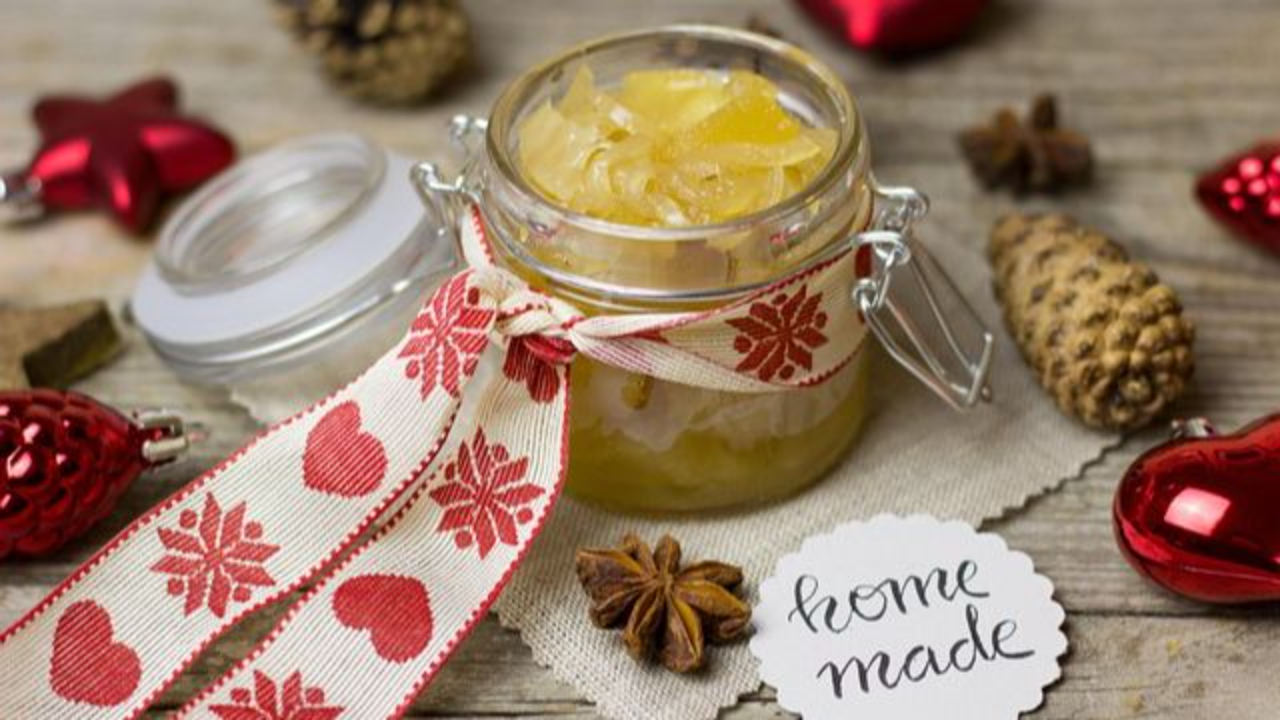
There are endless recipes for jams of all sorts, but I thought I would feature a few jelly and chutney recipes to ring the changes.
-
Jellies and chutneys are unique, beautiful and interesting to look at, delicious to eat and make wonderfully original gifts.
Many people are put off by the thought of making jellies, as the process does include straining the fruit mix through some form of filtering material, but sounds more complicated than it is.
As long as the the material is adequate and strong enough, and will allow the juice to drain freely without allowing any of the solid fruit particles through, various adaptions can be made.
If making jelly frequently, or in large quantities, it is probably worth investing in a "jelly bag".
It consists of a conical shaped material bag on a circular frame, with supporting loops.
The idea is that the fruit juice will slowly drain through the conical bag, whilst holding back the solid fruit mixture.
Traditionally, a walking stick or broom handle was threaded through the supporting loops and each end rested on the back of a chair or similar. A good sized container was placed under the conical jelly bag, to catch the filtered juice.
There are now many commercially available jelly bags with stands, such as on Amazon, https://amzn.to/46nljme, which are easy to use and store.
Ideally the process is left uninterrupted overnight, or over a period of 8-12 hours.
If only making jelly occasionally or in in small quantities, using a muslin or cheese cloth square or similar, would suffice.
Depending on quantity, a large enough container to catch filtered juice can be set up and the muslin or similar, attached in some way above it.
A large pot with a sieve or colander lined with muslin works well. Ingenuity is the name of the game!
Do not be tempted after filtering the juice, to try and press out more juice from the jellybag or filter.
This will discolour the finished jelly and make it cloudy. Jellies should be clear, bright and vibrant in colour.
However, the remaining fruit pulp needn`t go to waste. It can be the basis for a delicious crumble!
As a jelly is made from the extracted juice, the whole fruit is used in the pre filtering stages.
The fruit should be washed in cold water just before use, to remove any foreign particles. Some fruits such as blackberries retain moisture, and If the fruits are washed too far in advance, the water can be absorbed and will dilute the flavour.
Pat the fruits dry to absorb any excess water.
Cook the fruit mixture according to the recipe, and then empty contents in to jelly bag or filtering mechanism.
The next day, continue to cook the filtered juice according to instructions.
*********************
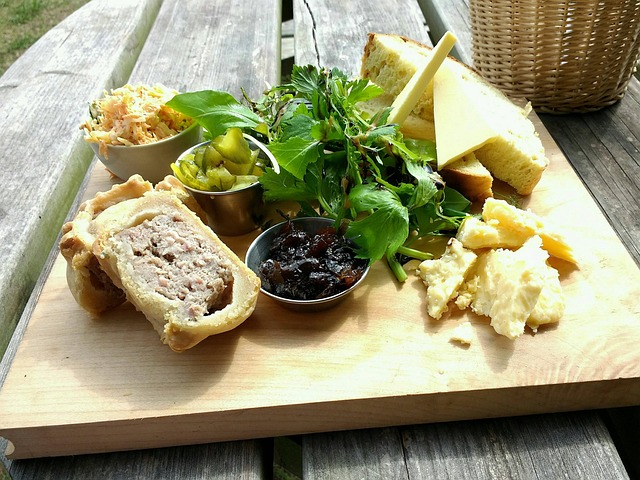
CHUTNEY:
Chutney is much easier and quicker to make than jam or jelly.
It is delicious with cheeses and all kinds of cold meats.
It is basically a mix of fruit, vegetables or both.
Flavourings and spices are added, and the whole thing is bound together with sugar, seasoning and vinegar.
There are generally no set quantities, but the basis often includes onions, sultanas or raisins.
Traditionally cooked in a large saucepan, the chutney is usually ready when the sugar is dissolved, and the mixture becomes thick and sticky.
Start by chopping the fruit/vegetables into small uniform pieces. (Not too large as will be difficult to eat, and not too small as will turn into a puree).
Put into a large saucepan and and cover with your choice of vinegar....cider, red or white wine or *balsamic. (*A bit on the expensive side)!
Add the spices, remembering not to overdo them, as not everyone likes highly spiced chutneys.
Add some granulated or brown sugar, and stir slowly until boiling point is reached. Stir to prevent sugar sticking to pan, but simmer until sugar is dissolved.
The amount of sugar depends on the balance with the vinegar.
If you like the chutney to be sharp and tangy, be a bit more sparing with the sugar.
The mixture should be thick and sticky. There shouldn`t be any liquid left in the base of the saucepan.
Have some sterilized warm jars at the ready, and fill with the chutney.
Seal with lids or paper covers immediately. Label with type of chutney and date.
Some years ago, I realized I didn`t have any chutney in the house and wanted it to accompany some cheese.
Very quickly, I finely chopped some red onions, added some sultanas, chillies, spices, seasoning and brown sugar.
I put it in a measuring jug and covered the ingredients with red wine vinegar.
I microwaved it for around 20 mins, gave it a stir, and microwaved for another 10.
The chutney was done, and tasted delicious.
Since then I have tried making all sorts of chutneys in the microwave.
It saves time if you are not wanting a large amount.
They usually turn out well, although tomatoes and rhubarb take a bit of watching as have a high water content.
Sterilizing jars is important.
*Jars and lids should be washed in hot soapy water and rinsed well.
*The wet jars and lids can be put on a baking tray in an oven at 140C / 120F for 10-15 minutes.
*Jars and lids can be put in empty dishwasher at highest setting, without cleaning agent.
*Lids with rubber seals can be washed in hot soapy water, rinsed and put in a saucepan of water. Boil for 10minutes.
*The sterilized jars should be warm and ready for the hot jam / jelly / chutney when setting point is reached.
*Wax discs can be placed on to the surface of the jam, (wax side down) to maximize seal.
*Lids or paper covers should be put in place immediately.
*Labels with type of preserve and date can be prepared in advance.
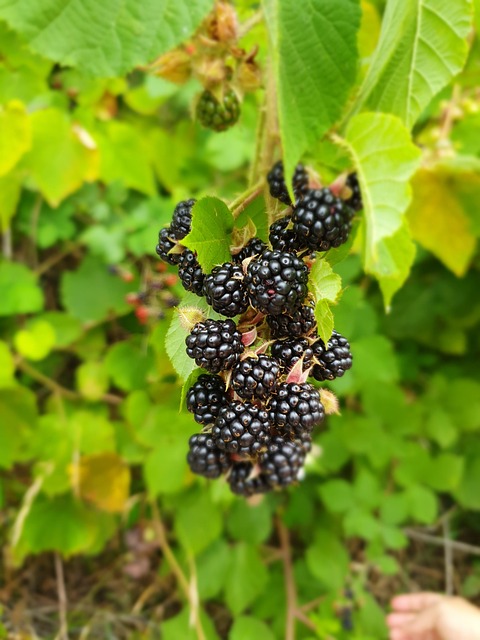
BLACKBERRY (BRAMBLE) JELLY INGREDIENTS:
1.3kg / 3lb blackberries washed...patted dry.
2 large cooking apples washed cored diced
450ml / 3/4 pint water
Juice of one lemon
Preserving or granulated sugar
2-3 tablespoon creme de cassis (optional)
Jam jars with wax discs, lids or paper covers. (If possible sterilize jars just before boiling jelly).
Prepare a jelly bag
METHOD:
Place blackberries, apple, water and lemon juice in a preserving or large heavy based saucepan
Bring to the boil, then simmer over low heat for 20-25 mins or until fruit is completely soft.
Tip soft fruit and juice into jelly bag and leave to drain overnight or 8-12 hours
Measure the juice. For every 600mls / 1 pint, add 450g / 1pound sugar
Put juice and sugar back into the clean preserving pan, over a low heat until sugar is dissolved. Add creme de cassis (if used), bring to boil and simmer for 10 minutes until setting point is reached.
Remove any scum from the top of the jelly and fill the newly sterilized jars up to the brim.
Use a wax disc, wax side down, before covering, sealing and and labelling.
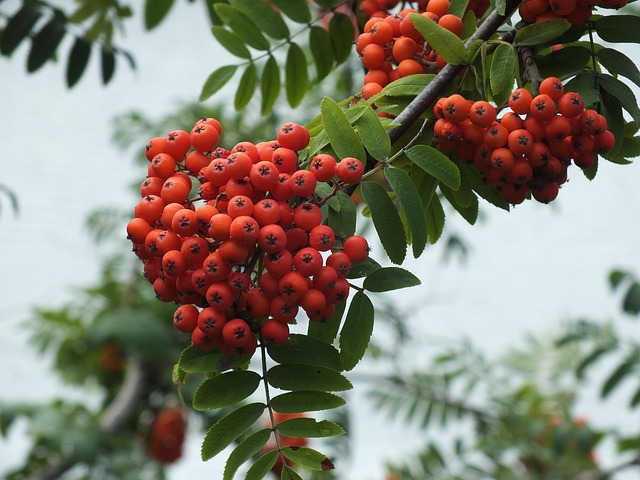
ROWAN JELLY INGREDIENTS:
450 g rowan berries
225g apples
Water
1 lemon (juice only)
COOKING INSTRUCTIONS:
Rinse and dry the rowan berries.
Chop the apples leaving on skin and core
Place all fruit in a pan with a little water, just covering fruit, and heat to boiling point, then simmer for 20 mins.
Mash fruit well with potato masher or similar.
Ladle fruit into a jelly bag or muslin bag and leave to drip overnight. (Do not squeeze out any excess juice from remaining fruit pulp, as this will make rowan jelly cloudy).
For every 600 ml / 1 pint juice, add 350 g / 12 oz sugar
Boil for 10-15 minutes until setting point reached
Ladle into jars, cover jam surface with a wax disc, and secure with lids or paper coverings.
Traditionally, when draining juice through a jelly bag or similar, a stick or broom handle was threaded through the jelly bag loops, and balanced undisturbed (between 2 chairs for example) overnight or for around 12 hours.
Depending how much juice is being filtered, it may still be the best method if there is a large amount of juice.
**Next day, do not be tempted to squeeze any excess juice from the fruit pulp in jelly bag, as this will make the rowan jelly cloudy. This applies to all jellies.
Setting point can be tested by chilling a plate in fridge, then when testing is required, place a small amount of jelly on to cold plate. Leave for a few minutes. If jelly is at setting point, it will crinkle up when pushed back with spoon or finger.
*********
Rose hips, may be harder to find than brambles and rowans, and may not be so prolific. However, if you can gather a quantity together, it is well worth making a rose hip jelly.
It goes with most meats and cheeses, and can be used as a glaze and an addition to add extra flavour to a red wine sauce or gravy.
Rosehips have little dry tufts at the end of the berry, which should be removed before cooking.
Wash the rosehips in cold water before placing in food processor.
As the mixture will be strained through a jelly bag or similar, there is no need to remove any other part of the fruit.
The small hair like wisps which are inside the rose hip, can be an irritant to the skin, so best to avoid contact.
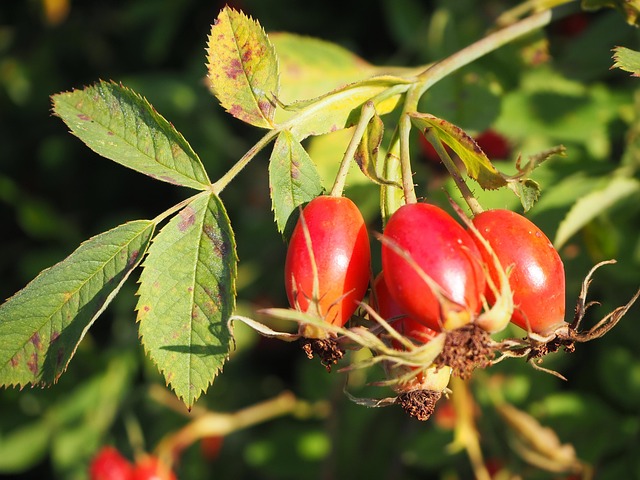
ROSE HIP JELLY INGREDIENTS:
450 g rosehips
1kg apples
500g sugar
juice of 1 lemon
COOKING INSTRUCTIONS:
Trim tufts off rosehips and discard
Pulse hips in food processor
Chop apples roughly and put into large pan
Cover with water...then add a further 1/2 pint 300mls
Bring to boil and cook till tender
Add rosehips
Simmer for another 10 minutes then cool slightly
Assemble jelly bag or similar and pour in mixture
Next day....measure liquid
For every 600mls / 1 pint add 400g / 14oz sugar
Put back in pan with lemon juice and slowly bring to boil till sugar dissolved,
Boil until setting point is reached (105C / 22F or crinkle test).
Cool a little before pouring into sterilised jars
Seal with lids or paper covers
********************
CHUTNEY SUGGESTIONS:
Onion, sultana, chilli and courgette.
Apple, cranberry and cinnamon
Courgette, pepper, ginger
Cauliflower, raisins, broccoli garlic
Tomato, curry and mint
Beetroot, raisin and rhubarb
Mango, sultanas and apple
SPICES:
Curry, turmeric, cinnamon, cloves, bay leaves, thyme, coriander, ginger, lemon grass, garlic, chilli, nutmeg.
Disclaimer:
Always make sure that you have identified the fruits or berries that you intend to cook with, and check if they can be eaten raw.
E.g. Rowan berries, rosehips, elderberries and elder flowers should not be eaten raw.
Affiliate Links:
The use of affiliate links in this blog, may contribute towards a small commission being paid, if someone should make a purchase.





